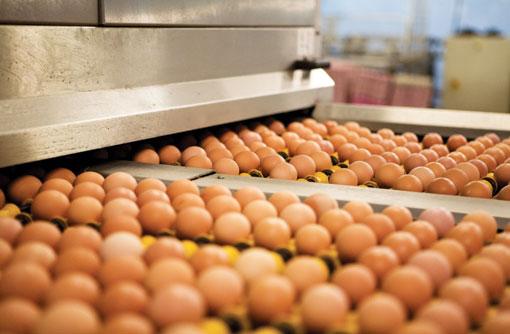Egg processors predict better prices

“We know that the egg market in the UK is going to go up, and the only question is ‘when?'” That was the predicition from Sara Gibbins of Manton’s at the recent Midlands Free Range Discussion Group meeting.
“When we look globally, proteins are in high demand, and the US is already seeing the egg market going up. In the egg-breaking sector we are forecasting that, when the egg market does move, it will move extremely quickly.
“That’s the good part for you, but it is scary for us,” she said. “We’ve got customers in contracts until 2012, and if the last quarter goes up as quickly as we are predicting, it could be painful for the breaking industry.”
She called on breakers and producers to work closely together for their mutual benefit. “We need to approach things differently. It’s grim for you at the moment, but the future looks good, and there is a tremendous amount of growth in the processing sector.
“Speak to your egg breakers, we do need your eggs. The timing may not be right, but the demand is there. The last thing we want to do is go to Europe to buy free-range eggs.”
Although they were in the same industry, producers and processors worked in different worlds, she explained.
“Your core focus is different from what we want to achieve. Eggs for breaking are mainly traded on the spot market. We do need to find a way to work closely together, and how you can supply us with eggs at a price that you are comfortable with.”
One producer in the audience said she was receiving just 17p a dozen for her seconds. “That is low,” responded Ms Gibbins. “For good-quality eggs, on a regular basis, we will pay above that price.”
She agreed with the suggestion that producers could band together to supply a local breaker. “Groups around the country are doing that. Speak to local breakers and see how you can form relationships.”
Continuity
One of the main challenges, she said, was continuity of supply. Huge quantities of egg products were needed to make the products to go on retailers’ shelves, in many cases in products that consumers didn’t appreciate. These included pasta, Quorn, coleslaw, sausage binder and glazing for pasties.
If, on average, an egg-processing business was breaking 100t a day, this would need more than 5,000 cases. Breaking for five days a week, would need 25,000 cases, “a huge amount of eggs”.
“This is only calculating for orders on a whole-egg basis. If orders from customers were for yolk or albumen, the figures would be triple.”
It was impossible to meet this demand from UK egg production alone, said Ms Gibbins. “In the UK last year, import figures were nearly 70,000t for liquid egg products. That’s nearly 1,346t a week with a value of £116m for imports.”
This demand was far too high for the UK to achieve self-sufficiency, especially as these figures did not include egg powder requirements.
Global demand
“At Manton’s, we are a bit different to other UK processors in that we are a global business and buy from all over the world,” Ms Gibbins told the meeting. “Because our raw materials come from producers whose core business is retail sales, if suddenly a retail promotion begins on shell eggs, our raw material can be pulled from us at any moment.
“As British egg breakers, we had to go to Europe to find more and more free range. What Europe then saw was a great opportunity for EU egg breakers to come into the market direct.
“In today’s market, we don’t import any free range because we have enough,” she added.
But the biggest problem was that free-range prices dropped drastically and margins were squeezed tighter. “So today, the free-range products we sell have become more of a commodity.”
One producer at the meeting wanted to know what guarantees there were that imported free-range eggs really were free range. “We only buy our free-range eggs in the shell and don’t import any liquid,” explained Ms Gibbins. “We have to have the full traceability back to the flock.
“We need to get the retailers to insist that food manufacturers use British egg processors, with British eggs, and for imports to only allow shell egg.”
